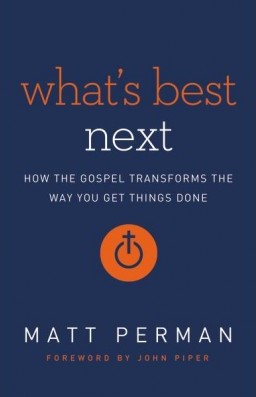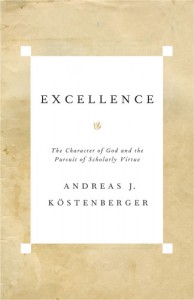A Review of Matt Perman’s What’s Best Next: How the Gospel Transforms the Way You Get Things Done (Zondervan: 2014)
By David H. Leonard, Assistant Professor of Philosophy and Apologetics, Luther Rice University, Atlanta, GA

It might be tempting to think that productivity is a topic more suitable for business leaders and entrepreneurs, for whom it’s essential to “get things done” as efficiently as possible. As Matt Perman argues in What’s Best Next, however, productivity is mainly about loving others by putting their needs first. Such an emphasis results not only in greater productivity, but is also consistent with a Christian view of such matters. Indeed, the implication is that all Christians, regardless of their vocation, are called to excel in their productivity. To achieve that goal, it’s not sufficient that we’re merely aware of the relevant skills of productivity; rather, our employment of these skills must be motivated and informed by a proper theological foundation. In this regard, Perman’s book offers readers a unique and insightful perspective on the topic of productivity, explicitly informed by the Christian faith.
Christian scholars, in particular, ought to take seriously Perman’s insights on productivity, for the ideas and principles he develops have direct relevance for the quality of their teaching and research. Whereas Andreas Köstenberger, for example, has challenged scholars to pursue their work with excellence, in terms of demonstrating boldness amidst the pressures of “academic respectability” and displaying integrity in their scholarly activities, Perman highlights for readers the practical steps that might be taken to clear the way for such excellence to be achieved.

To put it differently, if an excellence is roughly identical to a virtue, then it seems the aim of What’s Best Next is to enable Christians to be virtuous stewards of their time and resources, a theme which overlaps nicely with Köstenberger’s emphasis. Christian scholars, no doubt, would do well to reflect on these connections.
The first two parts of What’s Best Next are explicitly theological in their emphasis, and for good reason: Perman is developing the conceptual foundation for all that follows. As such, it would be a profound mistake to skip ahead to the practical, juicy bits. Central to Perman’s foundation is the notion of “Gospel-Driven Productivity,” which very simply means that “we are to use all that we have, in all areas of life, for the good of others, to the glory of God” (p. 28). Attentive readers will observe echoes of John Piper’s influence on Perman’s thinking throughout What’s Best Next, and especially in the first parts of the book. But as Piper himself acknowledges in the Foreword, “I doubt there is a person on the planet who knows both theological issues and time-management literature to the depth and extent Matt Perman does. This combination is at times mind-boggling” (p. 11).
It’s also worth noting that the various principles developed in the early parts of the book are directly connected to, and inspired by, what’s widely referred to in Lutheran circles as the doctrine of vocation. This is most evident in Perman’s discussion of good works, which he defines, perhaps somewhat too generically, as “anything we do in faith.” His insights are relevant not only for productivity, but for every sphere of our lives:
When you are answering emails, you aren’t just answering emails. You are doing good works. When you attend meetings, you aren’t just attending meetings. You are doing good works. When you make supper for your family, you aren’t just making supper for your family. You are doing good works. When you put the kids to bed, you aren’t just putting the kids to bed. You are doing good works’The activities of our everyday lives are not separate from the good works that God has called us to. They are themselves part of the good works that God created for us in Christ. And, therefore, they have great meaning (p. 79-80).
I find myself shouting a hearty “Amen!” in response to such remarks, as I’m convinced that our approach to our professional and personal lives has been radically harmed by the so-called “secular-sacred dichotomy,” which is precisely what the doctrine of vocation aims to address. In other words, at the heart of What’s Best Next is not fundamentally a set of rules and tools for life and workplace efficiency, but rather a compelling vision for how Christians should live out their faith with integrity, regardless of the station in life in which they find themselves. That, I believe, is also the essence of what it means to be “excellent.”
In the third part of the book, Perman helpfully emphasizes the importance of developing a personal mission statement, an ideal which I suspect few Christians have seriously thought about, even though many of his readers will be familiar with, for example, the Westminster Catechism’s view concerning the “chief end of man.” At any rate, Perman clearly outlines why most mission statements fail, the principles for creating mission statements that work, and finally why having a mission statement is essential for being an effective Christian. For Perman, the ultimate aim of successfully living out one’s mission is straightforward: “Well done, good and faithful servant. You have been faithful over a little; I will set you over much. Enter into the joy of your master” (Matthew 25:21).
Next, Perman reflects on the difference between a mission statement and a life goal, the latter being more akin to one’s vocation or calling: “Your mission is the ultimate reason for your existence—forever. It is your chief why. Your life goal is the concrete what. It is the chief way that you seek to fulfill your mission” (p. 171). To determine your life goal, Perman suggests you reflect on the following two questions:
- What would I do if I had all the money I needed and could do whatever I wanted?
- What would I do if I could do only one thing in the next three years?
As Perman explains, however, although nobody can tell you what your life goal should be, it is possible to get it wrong. Our life goal needs to be discovered, but in submission to the fact that we are not our own; we belong to God. The bottom line is this: to be productive in life, one’s activities and pursuits must have a telos in mind.
The remainder of What’s Best Next is decidedly more practical in its tone, in which Perman finally begins to outline his approach to productivity. Those readers who are familiar with the broader literature on the topic will notice the invariable references to the works of David Allen, Stephen Covey, Peter Drucker, and others. However, it would be a mistake to interpret Perman’s book as simply a baptized version of, say, Getting Things Done (GTD). On the contrary, Perman articulates some friendly criticisms of Allen’s system. For example, on the topic of creating a weekly schedule:

The issue is not that GTD gives no place to a schedule. The problem is that it doesn’t show you how your lists and your schedule relate specifically. Without clarity on this, I found that my lists were always fighting against my schedule. The key insight for me was when I realized that my next action lists had to be connected to my schedule in some way (p. 196).
Perman then proceeds to explain how to create a “basic schedule,” in conjunction with an emphasis on routines rather than lists, with a view to correcting the tendency of GTD to tempt people to overcommit to projects and responsibilities. These insights and others qualify What’s Best Next as a novel work on productivity in its own right, quite apart from its laudable theological underpinnings.
Throughout these later parts of the book are also a number of creative and valuable tips for increasing productivity. In particular, I found Perman’s approach to managing email and workflow to be especially helpful, in which he teaches readers how to write better emails, why it’s important to check email during regular times of the day, and how to create a filtering system for responding to emails. Perman also makes a handful of counterintuitive claims, which are nevertheless worth implementing. Consider the following reflections on the value of internet surfing in the workplace:
Research shows that employees who are able to surf the internet at work are 9 percent more productive. Why is this? It’s because of the way work is broken up. If you are writing a report, for example, it involves tasks such as formatting graphs, writing, gathering information, and a host of other such smaller components. To keep our energy up, we tend to reward ourselves with small breaks between each of these tasks. If we aren’t allowed to do this, our concentration drops (p. 249).
Of course, one of Perman’s most important claims serves as the inspiration for the book’s title: do what’s important first, not last. He explains the danger of the so-called “trap of the small stuff,” in which “we easily fall prey to the idea that before we can get to the big things, we need to get these smaller things clamoring for our attention out of the way” (p. 293). Perman urges readers to resist this inclination, as he believes it’s a trick. The problem is that when you focus your attention on small tasks, this inevitably leads to other small tasks. As a result, you might convince yourself that you’re being productive, but this will merely be fool’s gold since you weren’t accomplishing the most important tasks, the ones most capable of blessing those in your sphere of influence.
In all these insights and others, Perman proves himself to be a serious and thoughtful expert on productivity, and more importantly one whose vision of productivity is explicitly motivated by his Christian convictions. For those believers in academia, who have rightly been inspired by the ideal of integrating faith and learning, there is much to appreciate in Perman’s attempt to accomplish a similar kind of integration. At the very least, Christian scholars would do well to reflect on Perman’s concluding insight, and consider teaching and modeling it to the students in their classrooms: “Whatever your job is, wherever you are, it is both meaningful in itself and a means of advancing the gospel. It is through your work that God changes the world” (p. 319).

David Leonard teaches philosophy in the Atlanta area, is a freelance writer and editor, and is passionate about equipping Christians to discover their vocations. He has been published in Christianity Today, CASE Magazine, and the Southern Journal of Philosophy, and has spoken at conferences for the John Templeton Foundation, Global Scholars, and the Evangelical Philosophical Society. David holds the M.A. from Denver Seminary and the Ph.D. from the University of Arkansas. Follow him on Twitter @DrDavidLeonard.

Leave a Reply